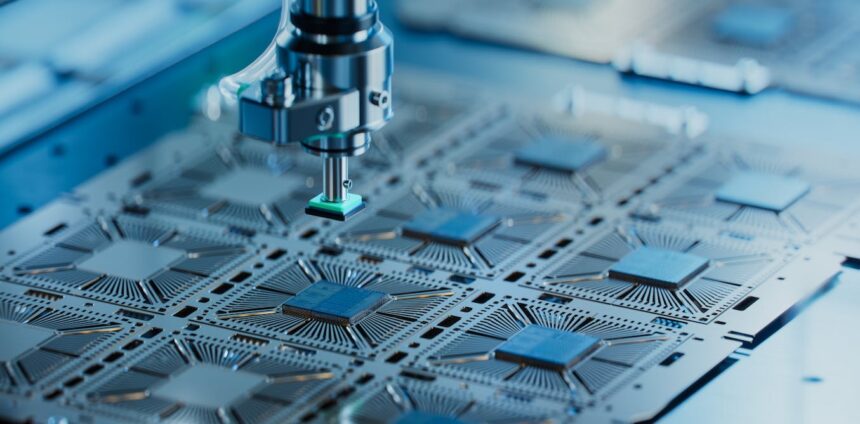Summary by Geopolist | Istanbul Center for Geopolitics:
The article from The Conversation discusses the significant impact of AI-driven demand for computer chips on global politics and security. Here are the key points:
Key Points:
- AI-Driven Chip Demand:
- The demand for advanced computer chips, crucial for AI development, is reshaping global politics and security.
- The U.S. leads in chip design, but most manufacturing is done in Taiwan.
- Investment and Market Growth:
- OpenAI CEO Sam Altman has called for a massive global investment ($5-7 trillion) to boost chip production for AI.
- The AI market is projected to reach $909 billion by 2030.
- Global Competition:
- Countries like the U.S., China, Japan, and European nations are increasing investments to secure their share of the chip industry.
- China is heavily subsidizing its chip industry to build a robust manufacturing supply chain.
- Geopolitical Tensions:
- Taiwan’s dominance in chip manufacturing is critical but also a point of tension, especially with China’s interest in reunification and the U.S.’s commitment to defend Taiwan.
- Disruption in Taiwan’s chip production could halt global industries.
- Raw Material Bottlenecks:
- Access to essential raw materials like rare earth metals, controlled predominantly by China, is a significant bottleneck in chip manufacturing.
- Technological Bottlenecks:
- Extreme ultraviolet (EUV) lithography, essential for advanced chip production, is monopolized by the Dutch company ASML.
- Shifts in Manufacturing Locations:
- Efforts to diversify chip manufacturing locations include new plants in the U.S. and Europe, though this will take years to significantly impact global supply.
- AI and Geopolitics:
- AI is also reshaping politics through the spread of disinformation, such as deepfakes, which can manipulate public opinion.
- Initiatives like the “Tech Accord” by major tech companies aim to combat deepfakes.
- Regulatory Measures:
- Legislation like the EU’s Digital Service Act and the UK’s Online Safety Bill seeks to regulate AI and its impacts.
Conclusion:
The increasing demand for AI-driven computer chips is influencing global politics and security, highlighting the strategic importance of semiconductor manufacturing and the need for diversified supply chains. The geopolitical race to secure these resources underscores the transformative power of AI on a global scale.
Read the full article below.
Demand for computer chips fuelled by AI could reshape global politics and security
A global race to build powerful computer chips that are essential for the next generation of artificial intelligence (AI) tools could have a major impact on global politics and security.
The US is currently leading the race in the design of these chips, also known as semiconductors. But most of the manufacturing is carried out in Taiwan. The debate has been fuelled by the call by Sam Altman, CEO of ChatGPT’s developer OpenAI, for a US$5 trillion to US$7 trillion (£3.9 trillion to £5.5 trillion) global investment to produce more powerful chips for the next generation of AI platforms.
The amount of money Altman called for is more than the chip industry has spent in total since it began. Whatever the facts about those numbers, overall projections for the AI market are mind blowing. The data analytics company GlobalData forecasts that the market will be worth US$909 billion by 2030.
Unsurprisingly, over the past two years, the US, China, Japan and several European countries have increased their budget allocations and put in place measures to secure or maintain a share of the chip industry for themselves. China is catching up fast and is subsidising chips, including next-generation ones for AI, by hundreds of billions over the next decade to build a manufacturing supply chain.
Subsidies seem to be the preferred strategy for Germany too. The UK government has announced its plans to invest £100 million to support regulators and universities in addressing challenges around artificial intelligence.
The economic historian Chris Miller, the author of the book Chip War, has talked about how powerful chips have become a “strategic commodity” on the global geopolitical stage.
Despite the efforts by several countries to invest in the future of chips, there is currently a shortage of the types currently needed for AI systems. Miller recently explained that 90% of the chips used to train, or improve, AI systems are produced by just one company.
That company is the Taiwan Semiconductor Manufacturing Company (TSMC). Taiwan’s dominance in the chip manufacturing industry is notable because the island is also the focus for tensions between China and the US.
Read more:
The microchip industry would implode if China invaded Taiwan, and it would affect everyone
Taiwan has, for the most part, been independent since the middle of the 20th century. However, Beijing believes it should be reunited with the rest of China and US legislation requires Washington to help defend Taiwan if it is invaded. What would happen to the chip industry under such a scenario is unclear, but it is obviously a focus for global concern.
The disruption of supply chains in chip manufacturing have the potential to bring entire industries to a halt. Access to the raw materials, such as rare earth metals, used in computer chips has also proven to be an important bottleneck. For example, China controls 60% of the production of gallium metal and 80% of the global production of germanium. These are both critical raw products used in chip manufacturing.
Photosince / Shutterstock
And there are other, lesser known bottlenecks. A process called extreme ultraviolet (EUV) lithography is vital for the ability to continue making computer chips smaller and smaller – and therefore more powerful. A single company in the Netherlands, ASML, is the only manufacturer of EUV systems for chip production.
However, chip factories are increasingly being built outside Asia again – something that has the potential to reduce over-reliance on a few supply chains. Plants in the US are being subsidised to the tune of US$43 billion and in Europe, US$53 billion.
For example, the Taiwanese semiconductor manufacturer TSMC is planning to build a multibillion dollar facility in Arizona. When it opens, that factory will not be producing the most advanced chips that it’s possible to currently make, many of which are still produced by Taiwan.
Moving chip production outside Taiwan could reduce the risk to global supplies in the event that manufacturing were somehow disrupted. But this process could take years to have a meaningful impact. It’s perhaps not surprising that, for the first time, this year’s Munich Security Conference created a chapter devoted to technology as a global security issue, with discussion of the role of computer chips.
Wider issues
Of course, the demand for chips to fuel AI’s growth is not the only way that artificial intelligence will make major impact on geopolitics and global security. The growth of disinformation and misinformation online has transformed politics in recent years by inflating prejudices on both sides of debates.
We have seen it during the Brexit campaign, during US presidential elections and, more recently, during the conflict in Gaza. AI could be the ultimate amplifier of disinformation. Take, for example, deepfakes – AI-manipulated videos, audio or images of public figures. These could easily fool people into thinking a major political candidate had said something they didn’t.
As a sign of this technology’s growing importance, at the 2024 Munich Security Conference, 20 of the world’s largest tech companies launched something called the “Tech Accord”. In it, they pledged to cooperate to create tools to spot, label and debunk deepfakes.
But should such important issues be left to tech companies to police? Mechanisms such as the EU’s Digital Service Act, the UK’s Online Safety Bill as well as frameworks to regulate AI itself should help. But it remains to be seen what impact they can have on the issue.
The issues raised by the chip industry and the growing demand driven by AI’s growth are just one way that AI is driving change on the global stage. But it remains a vitally important one. National leaders and authorities must not underestimate the influence of AI. Its potential to redefine geopolitics and global security could exceed our ability to both predict and plan for the changes.
By: Kirk Chang Professor of Management and Alina Vaduva
Source: The Conversation







